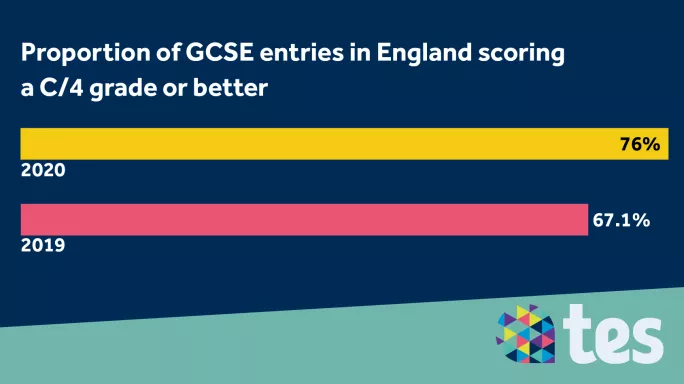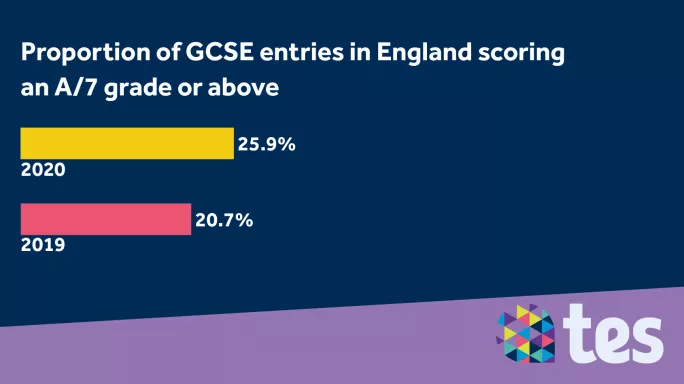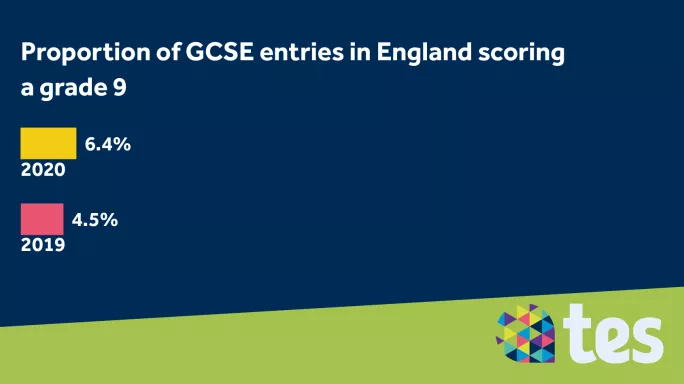
- Home
- GCSE results day 2020: U-turn means record top grades
GCSE results day 2020: U-turn means record top grades

The GCSE results released today mark the highest pass rate and the highest proportion of top grades in England since the qualifications were reformed.
The grade inflation follows the U-turn that led to Ofqual's largely abandoning its moderation model in favour of teacher-assessed grades.
GCSEs 2020: French and Spanish revival continues
GCSE results day 2020: LIVE
GCSE resit results: Grade 4s double in maths
This year, 76 per cent of entries scored a C/4 grade – considered a standard "pass" – or better in England, compared with 67.1 per cent last year.



And it also marks the highest proportion of A/7 grades and C/4 grades for a decade.
The highest proportion of A/7 grades or above previously this decade was in 2011, when 23.3 per cent of entries in England scored an A grade or above.
The highest proportion of pass grades previously this decade was in 2012, when 69.5 per cent of entries scored a C grade or above.
It has been a momentous week, with a government U-turn over exam grading on Monday that resulted in Ofqual reverting to using teacher-assessed grades for students this year – apart from where the moderated grade was higher.
Ofqual had predicted that GCSE grades would rise overall by nine percentage points if teacher-assessed grading was used.
'Bizarre' GCSE grade inflation
Teachers are reporting that students are receiving "bizarre" boosts to GCSE final grades, pushing them above the centre- assessed grades (CAG) that schools submitted.
Schools can only see the Ofqual moderated grades this morning when they are upgraded above the CAG to become a student's final result.
There are reports that, in some cases, final grades are well above the grades that teachers predicted.
The news comes as Ofqual revealed that it upgraded GCSE maths grades after the National Reference Tests indicated that there should be a "statistically significant" rise in scores at grades A/7 and C/4.
The regulator said that, in some cases, the moderated grade would be higher than the CAG because "evidence from the statistical standardisation suggests that the school’s judgements were a little severe."
However, some schools have been left baffled by some of the results that have been announced this morning.
A headteacher of a West Yorkshire school said that in one case, a student forecast a 1 in a subject had been given an 8 after the Ofqual moderating process.
He also had 12 students in the same subject whose final grades were four grades higher than the centre-assessed grades produced by the school.
The head said that these outcomes "beggar belief" and also meant students could potentially access an A-level courses that would not be appropriate for them.
Former Department for Education adviser Sam Freedman also highlighted the issue in a Twitter post.
GCSE grades 2020: 3Rs soar
The percentage of students achieving the highest grades in GCSE English and maths has risen significantly compared with last year, today's results show.
Data released today by exams regulator Ofqual shows that, in England, 3.4 per cent of students achieved a Grade 9 in English, compared with 2.2 per cent in 2019.
And 4.2 per cent of students achieved the top grade in maths – up from 2.9 per cent last year.
Read more here.
Analysis: How will they stop grade inflation now?
Reporter John Roberts asks whether Ofqual will be able to maintain "comparable outcomes" after this year's U-turn over grading.
The system aims to ensure fairness for cohorts from one year to the next and ensures the credibility of the exams system.
Following that approach this year meant that there were "students failing an exam they never had the chance to take", which is clearly unfair.
But he says he has been struck by comments from parents objecting to the idea that grades should be rationed to "arrive at a nationally acceptable overview", a process that happens every year.
Will the outrage over grading this year mean that comparable outcomes is no longer seen as a way of maintaining standards, but an "arbitrary way of ring-fencing failure for young people"?
Read more here.
WATCH: Heads and teachers spoke to Tes about today's GCSE results day 2020, and said the government needs to be grateful to the profession for steering a course through a difficult process.
See more reaction here.
Looking ahead: is this the end of the grading algorithm?
Tes news editor William Stewart asks whether the government's U-turn on A-level and GCSE grading spells the end of the grading algorithm.
"Now that so many parents have realised that A-level and GCSE results are in large part fixed – at macro level – by a computer algorithm, will that ever be allowed to happen again?" he says.
And he questions whether – given that so many influential voices, including Conservative MPs, have now argued for a policy that will bring about huge grade inflation – the drive to combat steadily rising results will remain a political priority?
Read more here.
How did we get here?
WATCH: Reporter Catherine Lough outlines how we got to today's results. After government U-turns and eleventh-hour decisions, she asks what the use of teacher-assessed grades could mean for equality.
Timeline
18 March: Exams are cancelled
The prime minister announces that schools will close following the outbreak of the coronavirus. All GCSE and A-level exams this year are cancelled.
"Of course, we will make sure that pupils get the qualifications they need and deserve for their academic career," Boris Johnson says.
3 April: Teachers to produce grade assessments and a rank order of students
Ofqual releases details of how a rank order of students for each grade and subject will be submitted by schools to exam boards, along with teachers' assessment of the grades students would have achieved had they sat the exams.
No mention is made of the use of historical school data to moderate grades.
15 April: Ofqual launches consultation on awarding grades
The regulator launches a consultation on how grades will be awarded in the absence of exams.
It says it will not check for bias against particular groups of students when examining teacher-assessed grades.
15 May: Details of the grading process released
Ofqual releases details confirming how its standardising process for grades will work this year.
Schools will award students a teacher-assessed GCSE or A-level grade, as well as supply a rank order of students by each subject and grade.
22 May: Ofqual announces consultation decisions
Ofqual says schools' historical exam performance will be given more weight to mitigate against "optimistic" teacher-assessed grades.
Improving schools will not have their trajectory taken into account, and the rank order of students cannot be changed to account for bias against students based on their ethnic or socioeconomic background.
21 July: Ofqual reveals grade inflation
The regulator says the "vast majority" of schools and colleges submitted grades that were "optimistic".
It will have to make major changes to these grades so the value of grades this year is not "significantly undermined".
If teacher-assessed grades were used, the 2020 results would go up by 12 per cent at A level, across all grades, and 9 per cent at GCSE, it says.
4 August: Scottish results released
The Scottish Qualifications Authority releases its results. While the pass rate for Highers goes up, students in less affluent areas are more likely to have their marks downgraded in the moderation process.
The Higher pass rate falls for the most disadvantaged by 15.2 percentage points and for the least disadvantaged by 6.9 percentage points.
11 August: U-turn number one
Following harsh criticism of injustices in the grading process, the Scottish government makes a U-turn.
All students whose teacher-assessed grades were marked down in moderation will have those grades withdrawn and be reissued with new grades “based solely on teacher or lecturer judgement”, Scottish education secretary John Swinney announces.
As a result, 124,000 results are reversed.
The NEU teaching union says this puts pressure on Mr Swinney's counterpart in Westminster to follow suit.
Mary Bousted, joint general secretary of the NEU, says the decision makes things "very difficult" for Ofqual, education secretary Gavin Williamson and schools minister Nick Gibb.
Dr Bousted adds that the grading scandal is a "cut-through issue" that will resonate with the public, likening it to Dominic Cummings' sojourn to Barnard Castle.
The Association of School and College Leaders strikes a more cautious tone, stating that "abandoning moderation obviously means [Scotland] is out of kilter with the rest of the UK, where standardisation is being used".
12 August: The 'triple lock' is announced
In an eleventh-hour announcement, education secretary Gavin Williamson says A-level students will be able to use their mock exam results to progress on to university and jobs.
He says students "could" appeal their grades to receive a "valid mock result", or sit exams in autumn if they are unhappy with their grades.
"This triple-lock system will help provide reassurance to students and ensure they are able to progress with the next stage of their lives," he says.
Last night’s announcement by @GavinWilliamson is extraordinary. After months of defending the system devised by @ofqual to determine this year’s GCSE and A level grades he has made an embarrassing U turn, reacting to yesterday’s announcement by John Swinney.
— Dr Mary Bousted (@MaryBoustedNEU) August 12, 2020
13 August: A-level results released
A-level results are released, with many students left devastated by grades far lower than they had been predicted.
Gavin Williamson appears on This Morning to defend the downgraded results.
This is the exact moment Gav just sealed his fate with the profession. How little he thinks of us. https://t.co/cSktglgLGH
— Amy Forrester (@amymayforrester) August 18, 2020
While the proportion of top grades increases overall, Geoff Barton, ASCL general secretary, says this hides "a great deal of volatility among the results at school and student level", describing the grades as "utterly unfair and unfathomable".
As it emerges that disadvantaged students were more likely to see their grades moderated downwards than their wealthier peers, Ofqual states that there is "simply no evidence" of bias in its standardising process.
Protests are planned by students to demand justice over the grades, while some seek legal action against the government.
15 August: Ofqual publishes – then removes – information on appeals
On Saturday afternoon, Ofqual publishes details of how students can appeal their A-level grades – only to abruptly withdraw these hours later.
It announced that students would be able to appeal using their mock exam results if they met eight criteria.
And Ofqual said that if pupils' mock exam results were higher than teacher-assessed grades, the teacher-assessed grade would be awarded on appeal.
But hours later, the details are withdrawn. Ofqual says the policy is "being reviewed" by its board and that further information will be released "in due course".
16 August: Kenneth Baker calls for GCSE delay
Former Conservative education secretary Lord Baker says GCSE results should be delayed after Ofqual's grading model produced "barely explicable" A-level downgrades.
17 August: Northern Ireland to use teacher-assessed grades
Northern Ireland announces it will use teacher-assessed grading; later in the day, so does Wales.
And, at 4pm, Ofqual announces that England will follow suit.
18 August: More ‘chaos’ over results timing
On Monday 17 August, the Department for Education announces that students will get their teacher-assessed grades on Thursday, but will need to wait a week for their “official grades” – the highest grade out of their teacher-assessed grade or the grade they received following Ofqual’s moderation process. Teacher say this delay only adds further “chaos” to the process.
But then on Tuesday morning, Gavin Williamson tells BBC TV news that pupils will find out their final grades on Thursday, while certification will follow “a week later”.
Excellent from @heymrshallahan for @tes.
— Mark Enser ? (@EnserMark) August 18, 2020
I’m just incredulous that the DfE STILL can’t say whether a week long delay is now the case or whether @GavinWilliamson was right this morning in saying they’d get the final result on Thursday.
Schools downloading results in 12 hours! https://t.co/P8Apk0mG5Z
Then, on the afternoon of Tuesday 18 August, an announcement comes from the Joint Council for Qualifications, promising that all schools and colleges will receive their results on time this year.
Register with Tes and you can read five free articles every month, plus you'll have access to our range of award-winning newsletters.
Keep reading for just £4.90 per month
You've reached your limit of free articles this month. Subscribe for £4.90 per month for three months and get:
- Unlimited access to all Tes magazine content
- Exclusive subscriber-only stories
- Award-winning email newsletters
You've reached your limit of free articles this month. Subscribe for £4.90 per month for three months and get:
- Unlimited access to all Tes magazine content
- Exclusive subscriber-only stories
- Award-winning email newsletters



